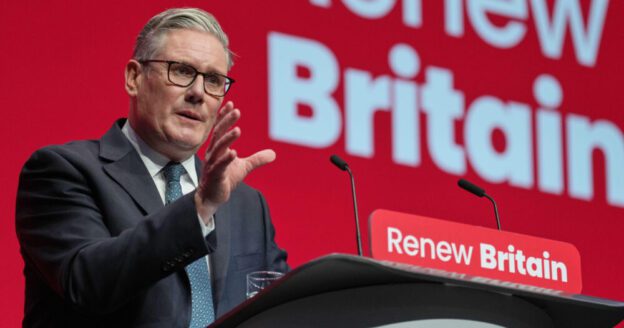GK’s Associate Director, Will Blackman, shares his take on the Conservative Conference.
This year’s Conservative Party conference – Kemi Badenoch’s first as party leader – was a major test for the party that has struggled to find its sense of direction after its catastrophic election defeat last year. Against a background of plummeting polling numbers, and criticism of what some see as Badenoch’s low energy and lethargical approach to the job, the opportunity was hers to lose. A successful conference was necessary to stabilise the ship and shore up her position, at least in the short term.
The conference began with a conveniently timed announcement of a new party policy – to leave the European Convention on Human Rights. Other headline grabbing announcements then followed; including a pledge to remove 750,000 illegal migrants, cutting overseas aid to 0.1% of gross national income, and £47bn of cuts to government spending, including welfare. These were preceded before the conference by a pledge to repeal the Climate Change Act 2008, which Badenoch said “tied us in red tape, loaded us with costs, and did nothing to cut global emissions”.
What these policies do tell us is that the Conservative Party has decided where it wants to focus its electoral energies. New policies that are thinly veiled replicas of longstanding Reform or Farage positions, including on migration, aid and net zero, are evidently not intended to appeal to so-called ‘blue wall’ voters that the party lost to disastrous effect to the Liberal Democrats at the last General Election. Instead, the so-called ‘red wall’, where Reform is increasingly at its strongest, it would seem is where the Conservatives want to apply their focus. How far this strategy can take the party, which continues to be out-polled by Reform by more than two-to-one, will be the defining story of the Conservative Party in this parliament, and of Badenoch’s leadership.
The conference itself was something of a mixed bag. Footfall was clearly significantly down on previous years, with reports of fringe events being cancelled and photos of a half empty conference hall on social media, all adding to the general sense of malaise. However, on the whole, shadow cabinet performances were fairly assured, with no major missteps or negative headlines. To that extent, the conference largely delivered what the party leadership needed it to.
The dog that didn’t bark during conference was further high-profile MP defections to Reform; much speculated about in recent weeks and hinted at by Nigel Farage himself following his own party’s conference. Whether it was ever true or if it was a case of cold feet, the Conservative leadership will have breathed a sigh of relief, at least for the moment.
Badenoch’s own speech on Wednesday was, on all accounts, a good performance. It won’t have escaped some people’s notice that many of her policy commitments appear to involve reversing policy decisions taken by the last Conservative government, with those on energy and net zero being the most obvious. Nevertheless, it was a speech that delivered the goods for now and received a strong reception from those in the hall. The announcement that a future Conservative government would abolish stamp duty will be music to the ears of many party members. However, with the prospect of a Conservative government taking office any time soon looking highly remote, the more interesting question will be whether the Labour government feels under pressure to make any moves of its own in this area between now and the next general election.
On balance, Badenoch has probably given just enough on policy and performance to see off any immediate threat to her position. However it remains the case that next year’s local elections will be the crunch electoral test for Badenoch’s leadership. Whilst some of the murmuring may fall away for now, without a significant positive change in the party’s polling position and as MPs grow increasingly concerned about losing their own seats, her longer-term future remains far from secure. Having only lost office last year, the Conservatives need more time for memories to fade on their record in office and to benefit from the failings of the Labour government. Unfortunately for Badenoch, with little discernible movement in the polls, time is not on her side.



